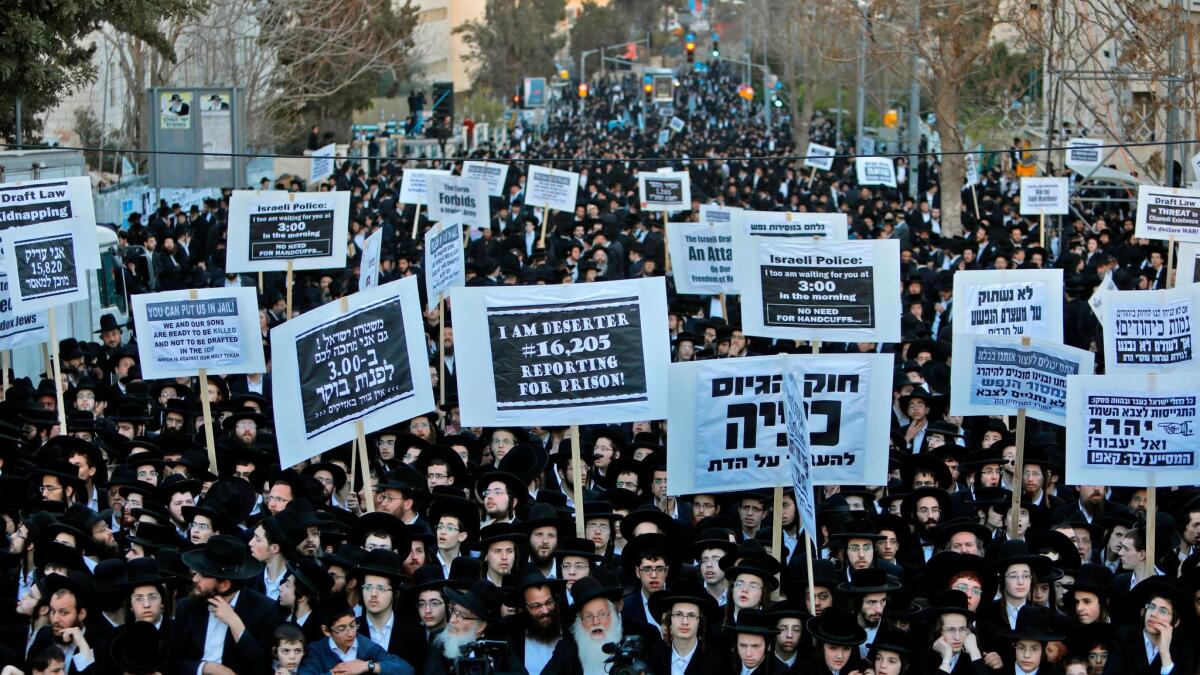Why two Israeli Supreme Court rulings could hurt Netanyahu’s governing coalition

- Share via
Reporting from JERUSALEM — Israeli Prime Minister Benjamin Netanyahu’s fragile governing coalition was dealt another setback Wednesday after back-to-back rulings by the Supreme Court stunned the country’s Orthodox Jewish establishment.
In one far-reaching decision, the court overturned the law granting ultra-Orthodox Jewish men an exemption from compulsory military service while they are studying at a yeshiva, or religious seminary. The ruling is set to take effect within a year.
In an unrelated decision, the court dealt the state rabbinate, Israel’s guiding religious authority, a significant blow by ruling that it does not have a monopoly on granting kosher certification to restaurants and other public establishments. That handed a victory to independent, more liberal religious entities that have increasingly clamored for the same right to oversee dietary certification.
Netanyahu, who was in Colombia and Mexico as part of a 10-day trip abroad, did not immediately respond to the bombshell rulings, handed down Tuesday. But they sent seismic shocks through his coalition, which includes Orthodox parties for whom few issues are more important than the draft exemption.

The question of drafting ultra-Orthodox young men who are studying in religious seminaries has vexed Israel for decades. A version of the exemption law has been on the books since the establishment of the state of Israel in 1948, but it has increasingly rankled the non-Orthodox majority, whose children are subject to a military draft at age 18, thus delaying the start of their college education by three years.
Eight out of nine justices agreed with the petitioners, the Movement for Quality Government, an independent good-government organization, that “the law perpetuates inequality between secular youths who are required to enlist in the army and religious youth who are exempt.”
In the past, ultra-Orthodox communities have responded to threats against the draft exemption with riots and attacks against the police, and they held a large protest in Jerusalem on Wednesday.
The matter of kosher certification has long rankled Israelis, most of whom do not adhere to religious law. Opening a non-kosher restaurant in Israel is simple, but anyone hoping to cater to an observant public has until now had to turn to the rabbinate, whose employees are routinely accused of corruption and mafia-like threats against establishments unwilling to pay the arbitrary amount of money demanded for each certificate.
The liberal newspaper Haaretz celebrated the decision by running the story of a pizzeria owner who was targeted by rabbinic employees. The headline: “A slice of pluralism.”
In an indication of the trouble Netanyahu faces when he returns, two of his senior Cabinet members reacted with radically different takes regarding the ruling on the draft. Interior Minister Aryeh Deri, who leads the ultra-Orthodox Shas party, said he had the prime minister’s agreement to present parliament with a law that would bypass the Supreme Court twin decisions. He described the prospective bill as “a new, strong law … with an ironclad clause so that the High Court won’t be able to meddle.”
In a sharp rebuttal, Defense Minister Avigdor Lieberman, who heads the right-wing but secular Jewish Home party, said he planned to propose a new law imposing mandatory service on ultra-Orthodox Jews as well as Arab citizens of Israel who have also been exempt. “Those who refuse to serve should know that it has a price — and it applies to everyone,” he said at a Jerusalem gathering for party members.
Netanyahu — already threatened by a growing corruption investigation — can ill-afford a split in his coalition. He commands a bare majority of 61 out of 120 seats in parliament.
But nothing has exposed or engaged Israel’s secular-religious divide like the case of Yigal Guetta, a member of the Knesset, Israel’s parliament, from Deri’s ultra-Orthodox party. In a radio interview Sunday, Guetta revealed that he had attended the same-sex wedding of his nephew two years ago. On Wednesday, after receiving a letter from five prominent rabbis calling for his dismissal, he resigned his seat.
Guetta, who described same-sex marriage as “an abomination,” explained that he went to the wedding out of family duty and the desire to please his sister and nephew.
“My nephew, Yam, called me to say he was getting married. He said, ‘I’m gay and getting married to a man in two months.’ I told my family we had to go,” he said in an interview. “We all went, the entire family.”
Guetta’s very human predicament, in which he was caught between strident religious authorities and familial love, struck a chord among Israelis, who have been riveted. Ultra-Orthodox politicians eager to criticize the justices seem stymied by Guetta’s dilemma.
Speaking on a radio news program, the minister for religious services, David Azoulay, also from the Shas party, declined to censure his colleague, mumbling through a response.
“I’m very sorry he’s resigning,” he said. “I haven’t seen the letter. I don’t know the rabbis. I’ve talked enough.” Attempting to pivot, he added, “To my great regret, the Supreme Court has made a big mistake.”
But it was a traditional homemaker, Suzy Ben Zvi, Guetta’s sister and the mother of the groom, who pointedly exposed the electoral high-wire act of politicians adopting strict rabbinic views.
“I’m not going to vote for Shas,” she told Israel’s Army Radio. “I’ve always voted for them. It’s one thing to stand up for principles, but what is this? I have 10 kids and I love them each. I don’t ask them who they are bringing home, if it’s an Ashkenazi or a European or whatever. I want my kids to bring home good people, that’s all I ask. It is none of their business.”
“That’s a mom,” reacted Kobi Sudri, the radio host.
ALSO
Sebastian Gorka says the GOP didn’t win last November, Donald Trump did
Site targeted by Israeli airstrike in Syria may have produced chemical weapons
Vast new intelligence haul fuels next phase of fight against Islamic State
Tarnopolsky is a special correspondent.
More to Read
Sign up for Essential California
The most important California stories and recommendations in your inbox every morning.
You may occasionally receive promotional content from the Los Angeles Times.










